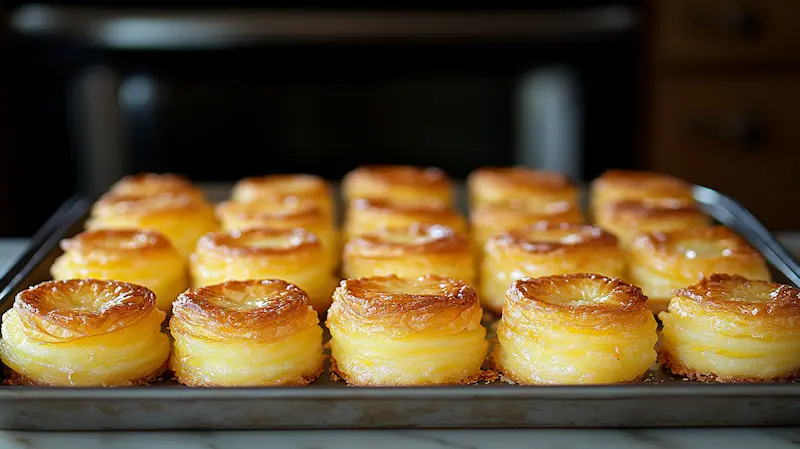Introduction: What is a Crookie?
If you’ve ever asked yourself, “How long do you cook a crookie for?”, you’re not alone. Crookies, the delicious hybrid of croissant and cookie, are a baking trend that’s here to stay. This indulgent dessert combines the flaky, buttery layers of croissant dough with the chewy, sweet goodness of cookie dough. But achieving the perfect crookie requires a careful balance, especially when it comes to cooking time.
How long do you cook a crookie for? The answer depends on factors like size, thickness, and oven temperature. Bake it too long, and you’ll risk burning the croissant layers. Too short, and the cookie dough may remain undercooked. In this guide, we’ll walk you through everything you need to know from baking times and troubleshooting common issues to creative recipe variations so you’ll never wonder again how long to cook a crookie. Let’s get started!
The Rise of the Crookie: A Hybrid Dessert Phenomenon
Hybrid desserts like the crookie have become increasingly popular in recent years, combining the best of two worlds to create something uniquely delicious. The crookie’s flaky, buttery base comes from croissant dough, while its cookie-like topping provides a rich and sweet flavor profile. It’s no wonder this innovative treat has captured the hearts of dessert enthusiasts worldwide.
Why Cooking Time Matters
Cooking time is crucial to achieving the perfect crookie. The layers of croissant dough need to be baked through, while the cookie layer must be golden and chewy. Too much time in the oven can dry out the croissant layers, while too little time can leave the cookie dough raw. Balancing these elements is key to making a crookie that is crispy, soft, and utterly delicious.
In the following sections, we’ll explore everything you need to know to bake crookies to perfection, from ingredient preparation to troubleshooting baking mishaps. Let’s get started!
Understanding Crookie Ingredients and Their Impact on Cooking Time
The Role of Dough Consistency: Cookie vs. Croissant
The crookie combines two very different types of dough, and understanding their behavior in the oven is essential to mastering the bake.
– Croissant Dough: This is a laminated dough, made up of multiple thin layers of butter and pastry. It requires even heat to puff up properly, achieving its signature flakiness. If underbaked, the dough can turn dense and chewy instead of light and crisp.
– Cookie Dough: On the other hand, cookie dough is thick and requires less time to cook through. However, it can spread or burn if exposed to too much heat for too long.
The key challenge is to synchronize the baking times of both doughs so they finish at the same time without compromising texture.
Temperature Sensitivity of Croissant Layers
Croissant dough is highly temperature-sensitive because of its delicate layers of butter. If the oven temperature is too high, the butter can melt out of the dough before it bakes, leaving a greasy mess. Conversely, a temperature too low prevents proper rising and creates a doughy center.
Pro Tip: Baking crookies at a consistent temperature of 350°F (175°C) typically works best, providing even cooking for both layers.
Choosing the Right Type of Chocolate Filling
The chocolate or other fillings inside your crookie can significantly affect the crookie baking time. Choosing the right filling is essential for ensuring the perfect crookie bake:
- Dark Chocolate: With its higher cocoa content, dark chocolate melts smoothly without burning easily, making it an excellent choice when determining how long to cook a crookie for.
- Milk Chocolate: Milk chocolate, due to its higher sugar content, tends to burn faster. You’ll need to monitor the crookie cooking duration closely to prevent overbaking.
- Alternative Fillings: Fillings like caramel, peanut butter, or fruit preserves can add exciting flavors to your crookies but may leak out and caramelize if the baking time isn’t adjusted. Keep a close eye on the oven to avoid any mishaps.
No matter which filling you choose, understanding how it impacts crookie baking time is key to ensuring your hybrid dessert turns out perfectly every time.
Key Takeaway
Understanding how croissant and cookie dough react in the oven and how fillings can impact baking times helps ensure consistent results every time you bake crookies.
Preparing to Bake the Perfect Crookie
Ideal Oven Temperature for Crookies
Setting your oven to the correct temperature is crucial when baking crookies. While croissants are usually baked at high heat (375-400°F), the presence of cookie dough requires a gentler approach.
– Recommended Temperature: 350°F (175°C) is the sweet spot for baking crookies. It ensures the croissant layers rise properly while the cookie dough cooks through without burning.
– Using a Thermometer: If you’re unsure about your oven’s accuracy, use an oven thermometer to confirm the temperature before baking.
Equipment You Need for Crookie Baking
To achieve a perfectly baked crookie , you need the right tools:
– Baking Sheet: Use a light-colored, non-stick baking sheet to avoid overheating. Darker pans can cause the bottom of the crookie to burn.
– Parchment Paper: Prevent sticking and ensure even baking by lining your baking sheet with parchment paper.
– Cooling Rack: Once baked, place the crookies on a wire cooling rack to avoid moisture buildup on the bottom.
Common Pre-Baking Mistakes to Avoid
1. Overworking the Dough: Handling croissant dough too much can break the delicate butter layers, leading to a tough texture.
2. Skipping the Chill Time: Both croissant and cookie dough benefit from chilling before baking, as this prevents spreading and ensures flakiness.
3. Crowding the Baking Sheet: Crookies expand as they bake. Leave at least 2 inches of space between them for even cook crookie.
Key Takeaway
Proper preparation like setting the right oven temperature and using the right equipment goes a long way in ensuring your crookies bake to perfection. Up next, we’ll answer the big question: how long do you cook a crookie for?
Cooking Time for Crookies: The Definitive Answer
Standard Cooking Time and Temperature for Homemade Crookies
The ideal cooking time for crookies largely depends on their size and thickness. However, a general rule of thumb is:
– Cooking Temperature: 350°F (175°C).
– Cooking Time: 18–22 minutes for regular-sized crookies (about 3-4 inches in diameter).
At this temperature and time frame, the croissant layers should puff up beautifully, while the cookie dough achieves a golden, chewy texture.
Pro Tip: Always check your crookies after the 18-minute mark. The cookie dough on top should be slightly golden but not over-browned, and the croissant layers should look crisp and flaky.
Adjusting Cooking Time Based on Size and Thickness
Not all crookies are created equal. You may need to adjust your cooking time if your crookies are smaller, larger, or thicker:
– Mini Crookies (1-2 inches): Bake for 12–15 minutes at the same temperature.
– Large Crookies (5+ inches): Bake for 22–28 minutes, keeping a close eye to prevent overcooking.
– Thicker Crookies: Reduce the temperature slightly to 340°F (170°C) and bake for 20–25 minutes to allow the center to cook through without burning the exterior.
Signs Your Crookie is Perfectly Cooked
The following signs indicate your crookie has achieved the perfect bake:
– Golden Brown Top: The cookie layer is golden but not too dark.
– Flaky Croissant Layers: The edges of the croissant dough are crisp, and the interior is fully baked.
– Set Center: Press lightly on the cookie layer if it springs back without leaving an impression, it’s done.
Pro Tip: To ensure the crookie is fully cooked, insert a toothpick into the center of the cookie layer. If it comes out clean or with a few crumbs, it’s ready.
Key Takeaway
Cooking crookies at 350°F (175°C) for 18–22 minutes is the sweet spot for most recipes. However, adjustments may be necessary based on the size and thickness of your crookies. Up next, we’ll address common baking issues and how to troubleshoot them.
Troubleshooting Crookie Baking Issues
Even experienced bakers can run into issues when making crookies. Here are some common problems and how to fix them:
Undercooked Crookies: Causes and Fixes
An undercooked crookie can ruin the experience by leaving raw dough in the center. Here’s why it happens and how to avoid it:
– Cause: The oven temperature may be too low, or the crookie was removed from the oven too early.
– Fix: Return the crookie to the oven for an additional 2–5 minutes. To prevent over-browning, cover it loosely with aluminum foil before reheating.
Pro Tip: If the crookie consistently comes out undercooked, try reducing the oven temperature by 10–15°F and baking for a longer period to allow the heat to penetrate fully.
Burnt Crookies: How to Avoid Overcooking
Overbaked crookies lose their chewy texture and develop a bitter, burnt taste.
– Cause: Oven hotspots or baking at too high a temperature.
– Fix: If you notice your crookies browning too quickly, lower the oven temperature by 25°F and extend the baking time slightly.
Pro Tip: Use light-colored baking sheets, as dark sheets absorb more heat and can cause the bottoms of your crookies to burn.
Common Textural Issues and Solutions
– Dry Crookies: This can happen if the croissant dough dries out before baking.
– Solution: Brush the croissant dough lightly with an egg wash before baking to seal in moisture.
– Spreading Cookie Dough: The cookie dough layer can spread too much during baking, creating an uneven crookie.
– Solution: Chill the cookie dough before layering it onto the croissant base to help it hold its shape during baking.
– Soggy Bottoms: This occurs when the croissant layers don’t bake properly.
– Solution: Place the crookies on the middle rack of the oven to ensure even heat distribution. Avoid placing them too close to the bottom heat source.
Key Takeaway
Troubleshooting baking mishaps is all part of the process. By identifying the issue whether it’s undercooking, overbaking, or textural problems you can make the necessary adjustments for flawless crookies every time. Up next, we’ll explore recipe variations and how they impact baking time.
Variations on the Crookie Recipe and Their Impact on Cooking Time
Crookies are incredibly versatile, and experimenting with different recipes can bring exciting new flavors to your baking. However, these variations can also affect cooking time. Here’s what you need to know:
Vegan and Gluten-Free Crookies
Creating vegan or gluten-free crookies requires ingredient substitutions that may alter baking times:
– Vegan Crookies: Replace butter with plant-based alternatives and use aquafaba or flaxseed as an egg substitute. These replacements often require slightly lower baking temperatures (340°F) and longer baking times (20–25 minutes) to prevent overbrowning.
– Gluten-Free Crookies: Gluten-free flours absorb moisture differently, making the dough denser. Bake at 350°F for the standard 18–22 minutes, but monitor closely for signs of doneness.
Adding Unique Flavors: Peanut Butter, Caramel, and More
Enhancing crookies with fillings or flavors like peanut butter, caramel, or fruit can elevate your dessert but also affect how long you cook them:
– Peanut Butter or Nut-Based Fillings: These fillings are thicker and may slow the cooking process. Add 2–3 minutes to the baking time.
– Caramel: Caramel can bubble and overcook quickly. Lower the oven temperature slightly to 340°F and check for doneness early, around 15–17 minutes.
– Fruit Preserves: The moisture in fruit preserves can make the dough soggy. Bake on the lower end of the time range and consider a slightly hotter oven (360°F) to crisp the croissant layers.
Experimenting with Air Fryers or Microwave Baking
If you’re short on time or don’t have access to an oven, you might wonder, “How long do you cook a crookie for?” Thankfully, alternative baking methods can be used to save time while still achieving delicious results:
- Air Fryers: Crookies can be air-fried at 325°F for 12–15 minutes, a quick option for achieving a golden, flaky exterior and a chewy cookie center. Ensure the crookies are placed on parchment paper to prevent sticking. This method is perfect if you’re looking for a faster crookie baking time.
- Microwave Baking: While not ideal for croissant dough, cookie-only crookies can be microwaved in small batches for 1–2 minutes on high. This technique offers a soft texture and significantly reduces the crookie cooking duration.
Key Takeaway
Recipe variations like vegan or gluten-free options, unique fillings, or alternative baking methods all require slight adjustments to cooking time and temperature. Be flexible and test small batches to perfect your approach. Up next, we’ll address frequently asked questions about baking crookies.
FAQs About Crookie Baking

Crookie
Ingredients
For the Croissant Dough
- 3 cups all-purpose flour Use high-protein flour for better structure.
- 1 cup unsalted butter Cold and cut into small cubes.
- 1 cup water Chilled.
- 2 tablespoons granulated sugar For sweetness.
- 1 package active dry yeast Proofed in water.
- 1/2 teaspoon salt Enhances flavor.
For the Cookie Dough
- 1 cup brown sugar Packed.
- 1/2 cup granulated sugar
- 1 cup unsalted butter Softened.
- 2 large eggs
- 2 teaspoons vanilla extract
- 2 cups all-purpose flour Sifted.
- 1 teaspoon baking soda
- 1/2 teaspoon salt
- 2 cups chocolate chips Dark chocolate preferred.
Instructions
Prepare Croissant Dough
- In a bowl, mix flour, sugar, and salt.
- Add butter and mix until it resembles coarse crumbs.
- Add chilled water and yeast mixture, mix until a dough forms.
- Knead the dough and let it rise for 1 hour.
Prepare Cookie Dough
- In a large bowl, cream together brown sugar, granulated sugar, and softened butter.
- Beat in eggs one at a time, then stir in vanilla.
- Combine flour, baking soda, and salt; gradually mix into the creamed mixture.
- Fold in chocolate chips.
Assemble Crookies
- Roll out croissant dough and cut into circles.
- Spoon cookie dough onto one half of each croissant dough circle.
- Fold over and seal the edges. Place on a baking sheet lined with parchment paper.
- Chill assembled crookies for about 15 minutes.
Bake Crookies
- Preheat the oven to 350°F (175°C).
- Bake for 18–22 minutes or until golden brown.
- Cool on a wire rack before serving.

